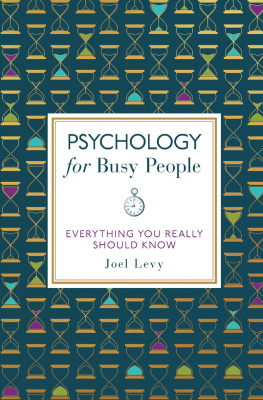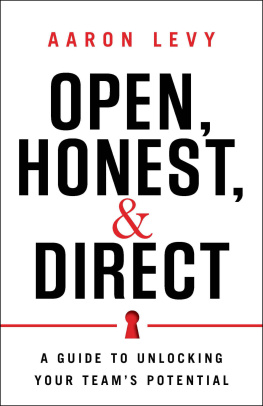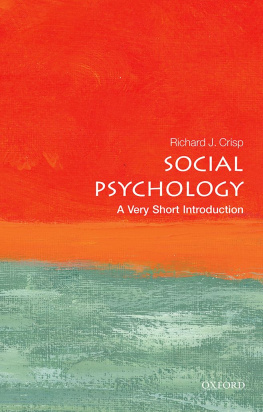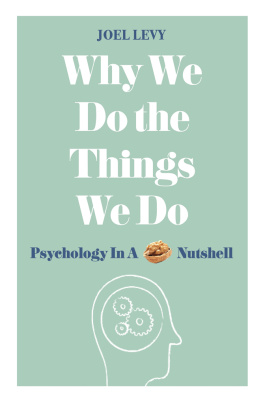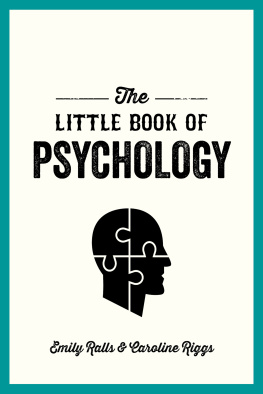Levy - Psychology for busy people: everything you need to know
Here you can read online Levy - Psychology for busy people: everything you need to know full text of the book (entire story) in english for free. Download pdf and epub, get meaning, cover and reviews about this ebook. City: London, year: 2019, publisher: Michael OMara Books Limited, genre: Religion. Description of the work, (preface) as well as reviews are available. Best literature library LitArk.com created for fans of good reading and offers a wide selection of genres:
Romance novel
Science fiction
Adventure
Detective
Science
History
Home and family
Prose
Art
Politics
Computer
Non-fiction
Religion
Business
Children
Humor
Choose a favorite category and find really read worthwhile books. Enjoy immersion in the world of imagination, feel the emotions of the characters or learn something new for yourself, make an fascinating discovery.
Psychology for busy people: everything you need to know: summary, description and annotation
We offer to read an annotation, description, summary or preface (depends on what the author of the book "Psychology for busy people: everything you need to know" wrote himself). If you haven't found the necessary information about the book — write in the comments, we will try to find it.
Psychology for busy people: everything you need to know — read online for free the complete book (whole text) full work
Below is the text of the book, divided by pages. System saving the place of the last page read, allows you to conveniently read the book "Psychology for busy people: everything you need to know" online for free, without having to search again every time where you left off. Put a bookmark, and you can go to the page where you finished reading at any time.
Font size:
Interval:
Bookmark:

PSYCHOLOGY
for Busy People
Also by Joel Levy
Freudian Slips
Why We Do the Things We Do

For my father
First published in Great Britain in 2019 by
Michael OMara Books Limited
9 Lion Yard
Tremadoc Road
London SW4 7NQ
Copyright Michael OMara Books Limited 2019
All rights reserved. You may not copy, store, distribute, transmit, reproduce or otherwise make available this publication (or any part of it) in any form, or by any means (electronic, digital, optical, mechanical, photocopying, recording or otherwise), without the prior written permission of the publisher. Any person who does any unauthorized act in relation to this publication may be liable to criminal prosecution and civil claims for damages.
A CIP catalogue record for this book is available from the British Library.
ISBN: 978-1-78929-100-1 in hardback print format
ISBN: 978-1-78929-101-8 in ebook format
www.mombooks.com
CONTENTS

P sychology is the study of the mind, but this simple formulation covers a dazzling and enormous field of human thought and behaviour, from the biology of the brain and nervous system to the meaning of love and happiness. Psychology has been called the science of humankind because it tries to achieve a scientific study of the things that make us human. The key word here is science; many other disciplines, such as philosophy, history and cultural studies, explore similar or overlapping fields, but psychology is different because it tries to approach them in a scientific fashion.
Science in this sense refers to a specific philosophy and methodology of knowledge and finding out. It involves using observations of phenomena (such as thoughts and behaviours) to formulate hypotheses, which are models or theories of how and why something happens. These hypotheses generate predictions that can be tested through experiments, and the degree to which the experimental results match up with the predictions confirms or invalidates the hypotheses. This at least is how science is supposed to work, and thus how psychology is supposed to work but, as you will learn, psychology is not always so straightforward.
Psychology is a massive and sprawling field and there are many ways in which it can be categorized, classified and divided. For instance, there is a difference between theoretical and applied psychology; the former explores the theories and first principles of psychological processes, while the latter seeks to apply psychological science to the real world, e.g. in treatment of mental illness.
This book broadly follows the typical textbook division of psychology, covering the following areas:
Biological psychology the study of the anatomy and physiology of the brain and nervous system.
Cognitive psychology the study of thinking, memory and emotion.
Interpersonal psychology how people relate to one another.
Differential psychology the ways in which people differ from each other, including personality and intelligence.
Social psychology the psychology of groups.
Developmental psychology how people grow, change and learn.
Optimal or positive psychology the psychology of happiness and well-being.
Abnormal psychology the study of mental disorders and how to treat them.

THE BRAIN AND THE NERVOUS SYSTEM
T o understand psychology, first we have to explore the science behind it, specifically the science of the brain: the building blocks of the nervous system and the basic divisions of the nervous system; parts of the brain and how they correspond to different functions; key research and historical case studies that have revealed the fascinating and sometimes bizarre consequences of the link between structure and function; and some of the most mysterious aspects of this link, such as consciousness, sleep and hypnosis.
Neurons and the nervous system
The nervous system is divided into the central and peripheral. The central nervous system includes the brain and spinal cord, while the peripheral includes the nerves that extend to your skin and muscles, and which carry sensory and motor signals, or impulses.
Both the central and peripheral nervous systems are made up of nerve cells or neurons. In its most common form, a neuron consists of a cell body with many projections leading away from it. Most of these projections are dendrites, which collect information from other neurons and bring it to the cell body. One of them, much longer than the others, is the axon, which can stretch up to 1 metre (3.3 feet) before branching to make contact with the dendrites of other neurons. In most neurons the axon is coated with a fatty white sheath called myelin, which acts as a kind of insulator, speeding the transmission of nervous signals.
Autonomic nervous system
In your body there is a whole system of nerves that is not under your conscious control. This is known as the autonomic nervous system, and it regulates aspects such as breathing, intestinal contractions, the relaxation and constriction of blood vessels, sweating and hair standing on end.
Signal processors and synapses
The neuron is like a tiny, electrically charged, biological microprocessor chip. It collects inputs from other neurons (via the dendrites), processes them (in the cell body) and gives an output (via the axon). By transporting ions across its cell membrane it builds up an electrical potential between the inside and the outside. If it receives enough inputs, a change in the cell membrane is triggered, causing rapid discharge of the electrical potential along its entire length. This produces a travelling electrical impulse known as a nervous signal. What happens next?
Nervous signals (the inputs and outputs of neuron function) are transmitted between neurons at a synapse (where the axon of one neuron connects to the dendrite of another, separated only by a tiny synaptic gap).
When a nerve signal arrives at the end of the axon, small packets of special chemicals known as neurotransmitters are released into the gap and picked up by receptor proteins on the other side.
If enough of these signals are picked up at this dendrite and others belonging to the receiving neuron, it generates its own electrical impulse and distributes the nervous signal.
Different transmitters are used by different types of neuron, or in different areas of the brain, or they may have differing effects on the same neuron some will excite the neuron, others will inhibit it, making it less likely to fire. Neurotransmitters play a vital role in controlling brain processes. By altering the subtle balance of neurotransmitters in the brain (by using pharmaceutical or recreational drugs, for instance), it is possible to affect mood, motor control, perception, memory and even consciousness itself.
For example, the neurotransmitter serotonin plays a major role in the production and regulation of emotions and mood. Serotonin levels change over the course of the day and the year, can be affected by the food you eat and are modified by antidepressants like Prozac and drugs like Ecstasy.
Breaking down the brain
The central nervous system includes the spine, the brainstem, the cerebellum and the cerebrum:
Font size:
Interval:
Bookmark:
Similar books «Psychology for busy people: everything you need to know»
Look at similar books to Psychology for busy people: everything you need to know. We have selected literature similar in name and meaning in the hope of providing readers with more options to find new, interesting, not yet read works.
Discussion, reviews of the book Psychology for busy people: everything you need to know and just readers' own opinions. Leave your comments, write what you think about the work, its meaning or the main characters. Specify what exactly you liked and what you didn't like, and why you think so.

